What Is Feline Hepatic Lipidosis?
Feline Hepatic Lipidosis (FHL) is a common and potentially life-threatening liver disease in cats.
It is also known as fatty liver disease and occurs when a cat's liver becomes overwhelmed with fat, leading to liver failure.
FHL can occur as a result of several underlying causes, including obesity, sudden weight loss, diabetes, and prolonged periods of anorexia.
Early detection and treatment are critical for the successful management of FHL.
Clinical Signs Of Feline Hepatic Lipidosis
The symptoms of feline hepatic lipidosis can vary depending on the severity of the disease.
The most common symptom is weight loss, which is often rapid and significant.
Other symptoms may include:
- Loss of appetite or anorexia
- Vomiting
- Diarrhea
- Jaundice (yellowing of the skin and eyes)
- Weakness and lethargy
- Dehydration
- Increased thirst and urination
- Behavioral changes, such as aggression or hiding
- Constipation
- Pale Gums
- Loss Of Muscle Mass
- Seizures
- Drooling
- Collapse
- Fainting
Treatment Options For Feline Hepatic Lipidosis
Treatment for feline hepatic lipidosis typically involves hospitalization and supportive care.
The primary goal is to restore liver function and address any underlying medical conditions.
This may involve:
- Nutritional support: Cats with hepatic lipidosis may require a feeding tube to provide them with the necessary nutrients.
- Fluid therapy: Fluids may be given to cats to prevent dehydration and help restore normal electrolyte balance.
- Medications: Various medications, such as antibiotics and anti-inflammatory drugs, may be used to treat any underlying infections or inflammation.
- Management of underlying conditions: If the hepatic lipidosis is caused by an underlying medical condition, such as liver disease or diabetes, treatment will be aimed at managing that condition.
Home Remedies For Feline Hepatic Lipidosis
There are no home remedies for feline hepatic lipidosis, and attempting to treat the disease at home can be dangerous.
If you suspect that your cat may have hepatic lipidosis, it is important to seek veterinary care immediately.
How To Prevent Feline Hepatic Lipidosis?
The best way to prevent feline hepatic lipidosis is to ensure that your cat maintains a healthy weight and has access to regular veterinary care.
If your cat goes through a period of anorexia, it is important to seek veterinary care immediately to prevent the development of hepatic lipidosis.
Affected Cat Breeds Of Feline Hepatic Lipidosis
Feline hepatic lipidosis can affect cats of any breed, age, or gender. However, overweight cats and cats with pre-existing liver disease are at a higher risk.
Causes For Feline Hepatic Lipidosis
Causes:
The exact causes of feline hepatic lipidosis are not fully understood, but several factors have been associated with the disease.
These include:
- Obesity: Overweight cats are at a higher risk of developing the disease.
- Prolonged anorexia: Cats who go without eating for a prolonged period of time can develop hepatic lipidosis as their body begins to break down fat for energy.
- Liver disease: Cats with pre-existing liver disease are at an increased risk of developing hepatic lipidosis.
- Stress: Stressful events, such as moving to a new home or the introduction of a new pet, can contribute to the development of hepatic lipidosis.
When To See A Vet For Feline Hepatic Lipidosis?
If you notice any of the symptoms of feline hepatic lipidosis in your cat, such as significant weight loss or lack of appetite, it is important to seek veterinary care immediately.
Early diagnosis and treatment can significantly improve your cat's chances of recovery.
Food Suggestions For Feline Hepatic Lipidosis
Diet plays a crucial role in managing FHL in cats. Cats with FHL require a nutrient-rich, high-protein diet that is easily digestible and provides adequate energy to support liver function.
Some food suggestions for cats with FHL include:
- Prescription diets recommended by veterinarians are specifically formulated for cats with liver disease.
- High-quality wet food that contains high-quality protein sources and is low in carbohydrates and fat.
- Homemade meals that are formulated by a veterinary nutritionist to ensure the cat's nutritional needs are met.
It is essential to consult with a veterinarian or veterinary nutritionist to determine the most appropriate diet for cats with FHL, as dietary recommendations may vary depending on the individual cat's medical history and overall health.
Conclusion
Feline Hepatic Lipidosis is a serious condition that requires prompt veterinary attention and management.
A proper diet is crucial in managing FHL in cats, and it is recommended to work with a veterinarian or veterinary nutritionist to determine the most appropriate diet for your cat.
By providing your cat with a nutrient-rich, high-protein diet, you can help support their liver function and improve their overall health and well-being.











